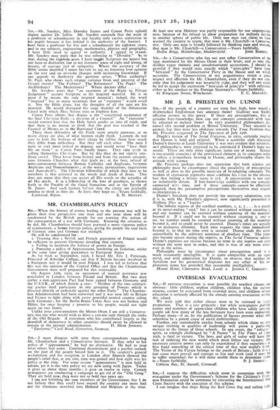MR. J. B. PRIESTLEY ON EUNNE
Ste,—If the people of a country are sixty feet high, how would a shipwrecked Englishman fare amongst them? Gulliver was Swift's effective answer to this query. If there are precognitions, bits of genuine fore-knowledge, how can our concepts connected with time be adjusted to include them? In 1937 assembled philosophers dis- cussed this second problem at Bristol University. They secured no answer, but they were less obdurate towards The Time Problem than Mr. Priesdey suggested in The Spectator of July 19th.
Dingle's review of The Serial Universe, in 1935, certainly implied that Dunne is bold and original. When a scientific club discussed Dunne's theories at Leeds University it was very evident that scientists, and philosophers, were prepared to be convinced if Dime's logic was sound. These are only three significant items out of many. Science is too acutely consciou: of the provisional element in its concepts today to refuse a sympathetic hearing to Dunne, and philosophy shares this attitude with science.
Mr. Priestley perhaps does not appreciate that both science and philosophy must be circumspect about the possibility of precognition as well as alive to the possible necessity of re-adapting concepts. The student of crustacean pigments must conform his ideas to the obvious fact that boiling a lobster turns it red. A precognition is not such an indubitable datum. If fore-knowledge conflicts with our concepts connected win time, and if these concepts cannot be effectively adapted, then the presumptive precognitions themselves may require re-interpretati. n.
Dunne's Seriahsm does not provide the necessary adaptation, even if it is, with Mr. Priestley's approval, now significantly presented in Nothing Dies as a "barrier."
The infinite regress of the cardinal numbers, I, 2, 3 ... is a puzzle at its never-ending "end," but z can be counted without counting 3. and any number can be counted without counting all the numbers beyond it. If 2 could not be counted without counting 3, and so on, no number could be counted without counting all the numbers beyond it, and so could never be counted. Dunne's times are actually in an analogous dilemma. Each time requires the time immediately beyond it, so that no. time ever is secured. Dunne ends the series unjustifiably by the arbitrary terminus of absolute time. The times also become spaces during the regress, as The Serial Universe admits Dunne's regresses are vicious because no term in any regress can exist without the term next in order, and this is true of any term what- ever in the series.
Philosophy must be circumspect about precognition until it is made reasonably intelligible. It is quite compatible with an open mind, and with admiration for Dunne, to observe that neither his Serialism nor his geometrical diagrams nor any other of his ex- planatory items has provided that reasonable intelligibility.
Mount Hotel, Clarendon Road, Leeds 2. JOSHUA C. GREGORY.






























 Previous page
Previous page